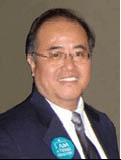4/17/2006 -- Houston Asian's population has exploded in the last few decades. During the 1990s it increased 76 percent, and now approximately 250,000 Asians call Houston home, according to U.S. Census figures. Two decades ago, dilapidated buildings and vacant lots marked Bellaire Boulevard in southwest Houston. Yet over the years it has become a thriving business district. Kenneth Li, owner of Century 21 Southwest, pioneered the way by building commercial properties first and then encouraging new immigrants to build their lives there, and thus the new Houston Chinatown came out of the dust.
Kenneth Li started his commercial real estate career in the early 1980s when his relatives began investing in retail and land properties. “When I really decided to get involved with commercial real estate, I found the best way to do it was to pursue the CCIM designation,” he says. In 1981, while Li was working on his undergraduate degree at Houston Baptist University, his uncle entered a joint venture with a Houston landowner to develop a shopping plaza on Bellaire Boulevard, a.k.a Diho Plaza. Li was involved with the project from the very start. They chose the location because it was convenient and close to a major freeway. Also, “It was surrounded by many apartments and a well-established subdivision at median rent and sales price ranges,” Li says. Besides, there was a very successful but small Asian grocery store nearby to attract Asian-Americans.
Seeing the potential for growth in the area, Li entered another joint venture to acquire a second shopping center near Diho Plaza in 1985. The 90,000-sf center, renamed Diho Square, was 80 percent occupied when Li purchased it, yet Houston's slow economy in the late 1980s soon caused occupancy to drop to 10 percent. Determined to hold Diho Square as a long-term investment, Li rode out the recession. He introduced investors from New York, California, and overseas to the area and injected more capital into Diho Square. He renovated the existing 32,000-sf grocery store into an Asian-themed supermarket to attract other tenants to the center and to serve the growing Houston Asian-American population. “To bring more traffic and security, we held major Houston events for the community and sponsored many chamber and civic activities like the Chinese New Year Festival,” he says. By 1992 Diho Square was 90 percent occupied. When asked about his Diho Square success, Li said, "It is all about timing. Of course you have to have good partners too."
Li began other commercial real estate projects to serve the increasing population. He developed two residential subdivisions consisting of 440 homes on 100 acres and currently is working on an office condominium building and a medical office property in the heart of new Houston Chinatown.
Long active in public affairs in Houston community, Kenneth Li served as the founding presidents of Greater Houston Chinese Real Estate Association as well as Asian American Real Estate Association, the founding board member of Asian Real Estate Association of America, National Association of Realtors President liaison to Hong Kong, the eighth president, senator and the eighteenth Chairman of Houston Asian Junior Chamber of Commerce, board member and vice president of both Taiwanese Chamber and Chinese Chamber of Commerce, Chairman of Association of Chinese Organization of Houston, Chairman of Asian American Business Council … He was appointed by Houston Mayors to serve as the first Asian American board member of City Planning Commission, Sharpstown Economic Development Authority and SW Houston Redevelopment Authority, and the Chairman of Sharpstown Management District.
Although Houston Chinatown is not yet a tourist destination in the Houston area, Li and other community members are working toward that goal. With help from city and local economic development authorities, the community has a couple of tools including a website, www.chinatownconnection.com, to inform the public of the Chinatown area attractions.
